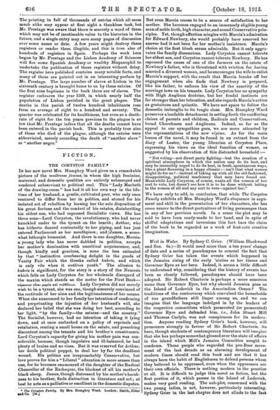FICTION.
THE CORYSTON FAMILY.* IN her new novel Mrs. Humphry Ward gives us a remarkable picture of the maitresse femme, in whom the high feminine, maternal, and domestic qualities are entirely submerged and rendered subservient to political zeal. This "Lady Macbeth of the drawing-room" has had it all her own way in the life- time of her husband, a gentle, cultivated peer, who only once ventured to differ from her in politics, and atoned for his isolated act of rebellion by leasing her the sole disposition of his great fortune and the control of his estates, disinheriting his eldest son, who had espoused Socialistic views. She has three sons—Lord Coryston, the revolutionary, who had never knuckled under to the tyrant on the hearth ; Arthur, who has hitherto danced contentedly to her piping, and has just entered Parliament as her mouthpiece ; and games, a some- what lethargic humanist. And there is one daughter, Marcia, a young lady who has never dabbled in politics, accepts her mother's domination with uncritical acquiescence, and, though kindly and gracious, is none the less animated by that "instinctive overbearing delight in the goods of Vanity Fair which the Greeks called hubris, and which is only vile when it outlives youth." The allusion to hubris is significant, for the story is a story of the Nemesis which falls on Lady Coryston for her wholesale disregard of the maxim which stands as the motto for the First Book- r6passor elvai xopfa 'cal Toii8Afw. Lady Coryston did not merely wish to be a tyrant, she was one, though sincerely convinced of the rectitude of her aims and the legitimateness of her means. When she announced to her family her intention of confirming and perpetuating the injustice of her husband's will, she declared her belief that she was doing her best, according to her light, "by the family—the estates—and the country." The Socialist, however, had no intention of taking it lying down, and at once embarked on a policy of reprisals and retaliation, renting a small house on the estate, and preaching discontent among the tenants and his brother's constituents. Lord Coryston's capacity for giving his mother pain was con- siderable, because, though impulsive and ill-balanced, he had plenty of brains and no vices. But it was reserved for Arthur, her docile political puppet, to deal her by far the deadliest wound. His politics are irreproachably Conservative, but love proves for him a "Liberal" education in more senses than one, for be becomes enamoured of the daughter of the Radical Chancellor of the Exchequer, the blackest of all his mother's black sheep. James, though distressed by his mother's harsh- ness to his brother, finds distraction in literature and art ; at best he acts as a palliative or emollient in the domestic disputes.
• The Coniston Family. By Mrs. Huraphry Ward. London: Smith, Elder sad Co. [6a.]
But even Marcia ceases to be a source of satisfaction to her mother. She becomes engaged to an immensely eligible young man of noble birth, high character, and sound Conservative prin- ciples. Yet, though affection mingles with Marcia's admiration for Edward Newbury, she would probably have reserved her answer had it not been for her mother's insistence. Marcia's choice at the first blush seems admirable. But it only aggra- vates the family dissensions. Lady Coryston cannot tolerate her eldest son, and Coryston cannot tolerate Newbury. He has espoused the cause of one of the farmers on the estate of Nevvbury's father, who is threatened with eviction for having married a divorced woman, and he encourages the wife to enlist Marcia's support, with the result that Marcia breaks off her engagement when she finds that Newbury is prepared, like his father, to enforce his view of the sanctity of the marriage laws on his tenants. Lady Coryston has no sympathy with High Anglican doctrine, but her feudal instincts are far stronger than her toleration, and she regards Marcia's action as gratuitous and quixotic. We have not space to follow the domestic imbroglio to its tragic close. Mrs. Hrimphry Ward preserves a laudable detachment in setting forth the conflicting claims of parents and children, Radicals and Conservatives,
broad Churchmen and Anglicans. Indeed, so far as the appeal to our sympathies goes, we are more attracted by the representatives of the new regime. As for the main lesson of the novel, it may be found in an extract from the diary of Lester, the young librarian at Coryston Place, expressing his views on the ideal function of women, as suggested by his observation of this distracted household:— " Not voting—not direct party fighting—but the creation of a spiritual atmosphere in which the nation may do its best, and may be insensibly urged to do its best, in fresh, spontaneous ways, like a plant flowering in a happy climate :—isn't that what women might do for us P—instead of taking up with all the old-fashioned, disappointing, political machinery that men have found out. Meanwhile Lady Coryston, of course, wants all the women of her sort to vote, but doesn't see how it is to be done without letting in the women of all and any sort to vote—against her."
We have only to add, in conclusion, that while The Coryston Family exhibits all Mrs. Humphry Ward's eloquence in argu-
ment and skill in the presentation of her characters, she has come nearer to the direct portraiture of living personages than in any of her previous novels. In a sense the plot may be said to have been ready-made to her band, and in spite of skilful adaptations and inversions this fact bars the claim of the book to be regarded as a work of first-rate creative imagination.














































 Previous page
Previous page